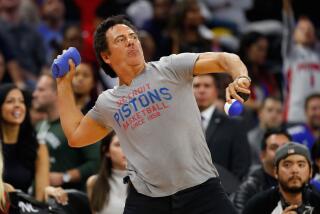Socker Partners Give Bell Confidence Vote
- Share via
SAN DIEGO — There were some anxious moments for Bob Bell early Tuesday evening when he left a meeting with his partners.
His fate as managing general partner of the Sockers was being determined.
Bell left the meeting with the understanding that he would be notified of their decision either later Tuesday night or Wednesday morning.
While a restless Bell waited at home, the limited partners--a majority of the 14 partners were present at the hastily called meeting--made their decision.
“The partners agreed to give Bob Bell a vote of confidence,” said limited partner Ness Tiano.
“And I’m not telling you we gave him a vote of confidence for three weeks (until the end of the season). It is for next year.”
It was a feeling of relief and satisfaction for Bell, who despite the Sockers’ four championships, has lost $9 million and has gone from owning 95% of the club in 1980 to just 17.5% today.
“I’m just pleased as punch,” Bell said. “It makes me feel that all the effort, time and sweat I have put in was worth it. Other people are behind me.
“They felt that after being appraised of the situation, I should get a vote of confidence. All along, I thought it was a lack of communication.”
Bell’s association with the Sockers began when he bought a minority interest in the La Vegas Quicksilvers in 1977. The team moved to San Diego in 1978. In 1980, Bell bought out his three partners for $1.5 million, and after the 1980 season he devoted his entire time to running the Sockers.
The financial burden on Bell became so substantial that he took in 12 investors in March, 1984. He has added two other investors since then.
Many of the limited partners have been frustrated at the Sockers’ attendance in the playoffs, the team’s poor financial status and Bell’s requests for additional funds after their initial investments.
But they agreed to stick with Bell.
The partners had planned to discuss Bell’s status after evaluating the team’s finances at the end of the season.
Before the playoffs began, the partners said Bell had to reach certain financial goals to ensure his job.
The Sockers had to play a maximum of 10 home playoff games and average more than 10,000 fans per game.
Both of those goals are virtually unattainable as the Sockers face the Tacoma Stars in the fourth game of their Western Division final series tonight in Tacoma.
Because of the poor attendance at the first four home playoff games (8,842 average) and because of the publicity surrounding Bell’s uncertain status, the partners decided to address the problem earlier than planned.
“We felt we should meet as soon as possible,” Tiano said. “Hopefully, we put this behind us once and for all. Nothing will happen next month.”
When asked if the Sockers could earn a profit this season, Tiano said: “That’s probably not in the cards, but there is substantial improvement over last year.
“We are a little disappointed with the results so far this year, but we’re thinking how we can improve the situation.
“The partners are frustrated, but we are excited about winning another championship. Now we have to see what we can do about beefing up attendance in the playoffs.”
San Diego’s average of 8,842 fans for four home playoff games, three of which have been played on weeknights, is considerably lower than the league playoff average of 11,363 per game.
The league average is a 34% increase over last season’s playoff average of 8,509 per game. Yet, the Sockers are down from an average of 10,216 fans for eight home playoff games last season.
According to Bell, the Sockers have a 40% higher attendance rate on Friday and Saturday night home games than for games played during the week.
However, the Sockers have been forced to schedule their playoff games around an indoor rodeo, Willie Nelson concert and ice show, which were booked into the Sports Arena during the weekends.
“Most of the limited partners are totally baffled why the management of the Sockers did not reserve weekend dates during the playoffs,” said limited partner Ron Fowler before Tuesday’s meeting.
“That’s (scheduling) ludicrous,” Fowler added. “We’ve been doing this (in the playoffs) for five years. The whole thing continues to show that the difference between the team on the field and the management is like night and day.”
Those types of feelings precipitated the meeting Tuesday afternoon. Bell explained his situation and his partners ended up supporting him.
“What they want is what I want,” Bell said. “We want the Sockers to work and to be successful. We will make it work.”
More to Read
Go beyond the scoreboard
Get the latest on L.A.'s teams in the daily Sports Report newsletter.
You may occasionally receive promotional content from the Los Angeles Times.










